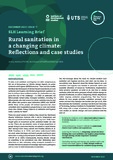| dc.contributor.author | Kohlitz, Jeremy | |
| dc.contributor.author | Kumar, Avni | |
| dc.contributor.author | Iyer, Ruhil | |
| dc.coverage.spatial | Lao PDR | en |
| dc.coverage.spatial | Bangladesh | en |
| dc.coverage.spatial | Burkina Faso | en |
| dc.date.accessioned | 2023-11-30T11:56:21Z | |
| dc.date.available | 2023-11-30T11:56:21Z | |
| dc.date.issued | 2023-12 | |
| dc.identifier.citation | Kohlitz, J.; Kumar, A., and Iyer, R. (2023) ‘Rural Sanitation in a Changing Climate: Reflections and Case Studies’, SLH Learning Brief 17, The Sanitation Learning Hub, Brighton: IDS, DOI: 10.19088/SLH.2023.018 | en |
| dc.identifier.isbn | 978-1-80470-163-8 | |
| dc.identifier.uri | https://opendocs.ids.ac.uk/opendocs/handle/20.500.12413/18193 | |
| dc.description.abstract | To date, rural sanitation and hygiene are often conspicuously left out of discussions on climate change impacts on water, sanitation and hygiene (WASH) services. There are few studies that illustrate the impacts of climate hazards and shocks on rural sanitation and hygiene and limited programmatic guidance on how to achieve more resilient systems. Research about the climate impacts on rural sanitation and hygiene are needed to persuade action and equitable allocation of resources. Furthermore, implementers need practical guidance on what to do and how to situate sanitation within the wider pressures of both climate change on people’s livelihoods, as well as integrating climate adaptations within ongoing sanitation programming.
With this rationale, the Sanitation Learning Hub (SLH) and University of Technology Sydney's Institute for Sustainable Futures, (UTS-ISF), along with a range of partners, have undertaken three case studies on climate change and rural sanitation with the aims of:
• Building the evidence on the direct and indirect impacts of climate hazards on rural sanitation and hygiene practices.
• Using participatory research methods to understand diverse local realities and experiences.
• Exploring the feasibility of integrating climate-sensitive thinking into rural sanitation and hygiene programming through trialling climate-responsive sanitation interventions.
• Facilitating learning and sharing with partners within and across case study regions to think through evidence-based recommendations for sanitation programming.
The case studies, spanning three countries, collectively address each of these objectives, although not all case studies focus on every objective. They represent a spectrum of initiatives to collect evidence of climate impacts on rural sanitation and take climate action within rural sanitation programming (see Figure 1). This SLH Learning Brief provides a brief summary of these case studies, reflections from the SLH and UTS-ISF on their experiences developing the case studies, the results of a learning workshop between the partners involved in each case study, and a proposed way forward. | en |
| dc.description.sponsorship | Sida | en |
| dc.language.iso | en | en |
| dc.publisher | The Sanitation Learning Hub, Institute of Development Studies | en |
| dc.relation.ispartofseries | SLH Learning Brief;17 | |
| dc.rights | Attribution-NonCommercial 2.0 UK: England & Wales | en |
| dc.rights.uri | http://creativecommons.org/licenses/by/4.0/ | en |
| dc.subject | Climate Change | en |
| dc.subject | Gender | en |
| dc.subject | Health | en |
| dc.subject | Participation | en |
| dc.title | Rural Sanitation in a Changing Climate: Reflections and Case Studies | en |
| dc.type | Series paper (non-IDS) | en |
| dc.rights.holder | © Institute of Development Studies 2023 | en |
| dc.identifier.externaluri | https://sanitationlearninghub.org/resource/rural-sanitation-in-a-changing-climate-case-studies-and-reflections | en |
| dc.identifier.team | Participation Power and Social Change | en |
| dc.identifier.doi | 10.19088/SLH.2023.018 | |
| dcterms.dateAccepted | 2023-12 | |
| rioxxterms.funder | Default funder | en |
| rioxxterms.identifier.project | The Sanitation Learning Hub | en |
| rioxxterms.version | VoR | en |
| rioxxterms.versionofrecord | 10.19088/SLH.2023.018 | en |
| rioxxterms.funder.project | 1febe277-fb18-46a0-a0a4-ac9247db4099 | en |


